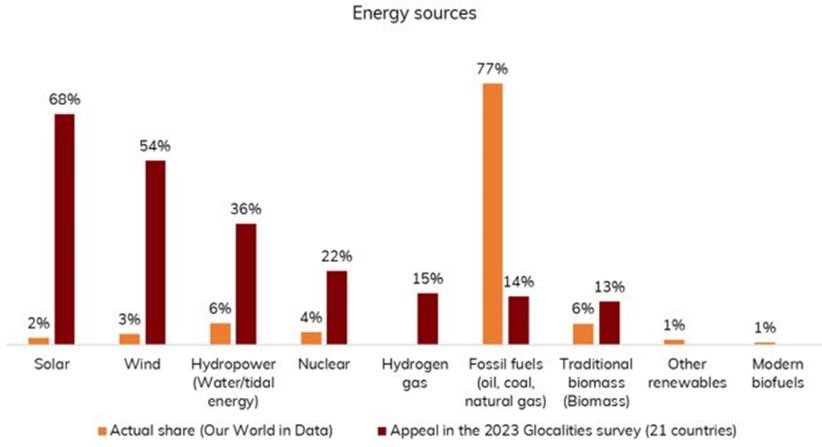HARVESTING SOLAR POWER FIVE TIMES MORE FAVORED THAN BURNING FOSSIL FUELS
Beneath the turbulent seas of international politics, a powerful force is quietly shaping the future of the energy market: the voice of the people. At the heart of the transition to clean energy lies the question of leadership. This international survey offers new insights and recommendations on how leaders can more deeply connect and resonate with the values, aspirations and energy preferences of citizens worldwide, in order to accelerate the transition to clean energy.
The report on Harnessing Solar Power was produced by international research agency Glocalities in collaboration with the international advocacy organisation Global Citizen, and The Fossil Fuel Non-Proliferation Treaty Initiative, a global effort fostering international cooperation to end new development of fossil fuels.
SUMMARY OF THE SURVEY RESULTS
Citizens in all 21 countries that were surveyed massively gravitate towards energy from the sun instead of fossil fuels. While currently 77% of the global energy consumption comes from fossil fuels (oil, coal and natural gas), only 14% of the international population favors energy from fossil fuels.
Simultaneously, solar energy is the most favored energy source, internationally, with 68% of respondents preferring solar energy. Nevertheless, currently, only 2% of the global energy consumption originates from solar energy. The preference for solar energy is followed by wind energy (54%), hydropower (36%) and nuclear energy (24%).

When it comes to energy production people favor harvesting energy from the natural flow of light, wind and water instead of burning fossil fuels. Survey data from the USA further shows that Republican voters (including Trump, De Santis and Pence supporters) also strongly favor solar power over fossil fuel (see the report for further details).
Leadership is pivotal for driving the energy transition. With respect to leadership styles, the Visionary (50%) is the most trusted and the least polarizing style. The Connector (47%), who brings people together to make decisions, is the second most trusted leadership style. The Boss (14%), however, is the least trusted and most polarizing leadership style. The massive gravitational pull of solar energy in combination with the need for more Visionary and Connecting leadership in the international population offer major opportunities for accelerating the transition to clean energy.
SOLAR POWER: THE MOONSHOT OF OUR TIMES
The international survey results reveal that providing the world population with access to solar energy will be a game changer. The preference for solar power is a unifying topic that promises to be a highly impactful milestone in human history. However, to realize this, it is pivotal for leaders to resonate and connect with deeper values of people from around the world.
FULL REPORT AND DETAILS
The full report can be downloaded for free by filling out the form at the side of this page.
Learn more about:
- How to connect with the values and preferences of citizens
- Differences and commonalities between countries in the preference for energy sources
- The case based on survey results from the USA
- How leaders can upgrade their leadership style and cooperate more effectively
- The moonshot for solar power and examples from history
- Recommendations for a rapid transition to a future with clean energy
MORE INFORMATION ABOUT THE SURVEY
Martijn Lampert, Research Director Glocalities:
SURVEY METHODOLOGY
For the Glocalities research 21,290 respondents were interviewed online in 21 countries. The fieldwork took place between 27 January and 20 June 2023 in the following countries: Australia, Belgium, Brazil, Canada, China, France, Germany, India, Italy, Japan, Mexico, Netherlands, Poland, Romania, South Africa, South Korea, Spain, Sweden, Türkiye (Turkey), United Kingdom and the United States. These countries cover every continent and collectively host more than 50% of the world population. The surveys were conducted through the online research panels of Dynata, an agency that is specialized in international fieldwork. In the Netherlands we used the panel of Glocalities’ sister company Motivaction. Quotas were set beforehand, and the datasets were weighed according to national census data with respect to age, gender, education and region. Each country has an equal weight in the total dataset when conducting international analyses. For the full methodology we refer to the survey report.
About Glocalities
Glocalities is an Amsterdam-based international research agency that specializes in global insights based on values, culture and psychology. The Glocalities research program, that started in 2014, now covers more than 35 countries. NGOs, companies and the public sector use Glocalities insights to connect with audiences, based on a deep understanding of trends, people and cultures. In the international Glocalities surveys, we have incorporated several research instruments that provide a deeper understanding of people, such as values segments, universal archetypes and trends. These instruments make it possible to obtain a holistic view of groups of citizens and gain a deeper knowledge of their drivers, aspirations and behaviors. Free reports on a multitude of topics such as the transition to a more sustainable future are available on our website.
About Global Citizen
Global Citizen is the world’s leading international advocacy organization on a mission to end extreme poverty NOW. Powered by a worldwide community of everyday activists raising their voices and taking action, the movement is amplified by campaigns and events that convene leaders in music, entertainment, public policy, media, philanthropy and the corporate sector. Over the past 10 years, $43.6 billion in commitments announced on Global Citizen platforms has been deployed, impacting nearly 1.3 billion lives. Established in Australia in 2008, Global Citizen’s team operates from New York, Los Angeles, London, Paris, Berlin, Melbourne, Toronto, Johannesburg, Lagos and beyond. For more information, visit globalcitizen.org
About the Fossil Fuel Non-Proliferation Treaty Initiative
The Fossil Fuel Non-Proliferation Treaty Initiative is a global effort fostering international cooperation to end new development of fossil fuels, phase out existing production within the agreed climate limit of 1.5°C, and accelerate a just energy transition by developing plans to support workers, communities and fossil fuel dependent countries to create safe and healthy livelihoods. For more information, visit https://fossilfueltreaty.org/


